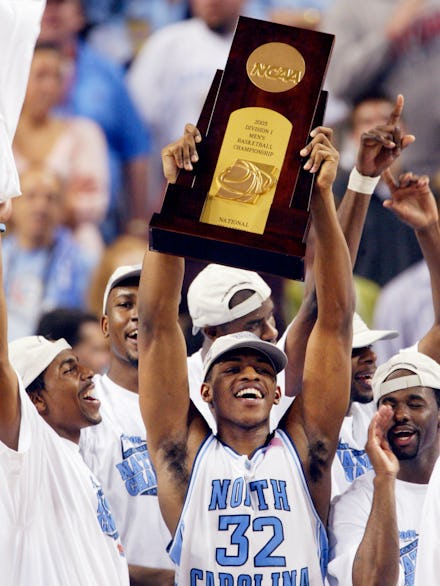The Latest Twist in a Massive Scandal Proves Colleges Value Athletes More Than Students

The news: This is Rashad McCants.
Image Credit: AP
In 2005, he played for the University of North Carolina at Chapel Hill basketball team that won the NCAA championship.
Image Credit: AP
But the 29-year-old made national headlines on Thursday when he told ESPN's Outside the Lines about his role in a scandal that's rocked his school for the past few years.
Among other revelations, McCants claims he received four A-grades and even made the Dean's List for classes he never even attended.
"I thought it was a part of the college experience, just like watching it on a movie from He Got Game or Blue Chips," he told OTS. "... when you get to college, you don't go to class, you don't do nothing, you just show up and play."
This lands him among the startling number of UNC athletes who've had courses and grades illicitly manipulated to remain eligible for competition.
Really? According to McCants, the university's tutors, advisers, department heads and coaches were all complicit in this academic travesty.
Like ex-UNC football player Deunta Williams before him, McCants claims to have been steered by advisers into "paper courses," wherein players were rarely — if ever — expected to show up, and final grades were either fudged or based on one or two paper assignments.
These papers were no masterpieces. Here's one submitted by a student who received a final grade of A-:
Image Credit: ESPN
In many cases, McCants added, tutors even wrote the papers for the athletes.
Also: These revelations draw negative attention to the school's Afro-American Studies department, which housed most of the "paper courses." The Carolina Black Caucus has deflected much of this criticism by calling it "inaccurate" and "gossip," but Phillip Jackson of Chicago's Black Star Project education initiative told ESPN that this was nothing short of "appalling."
"I think that that Black Caucus should be ashamed of themselves," he told EPSN. "They should be the ones leading the charge to ensure that African-American student athletes are getting the best education possible."
While at UNC, McCants received six Cs, one D and three Fs outside the Afro-American Studies department. But within that department, he "earned" 10 As, six Bs, one C and one D.
Coincidence? Probably not. When asked whether head coach Roy Williams was aware of these practices, McCants responded that he "knew 100%."
"It's hard for anybody not to know about the fact that we're taking African-American Studies courses and we don't have to go to class," he told Outside the Lines. "I think that's very obvious. Especially when [Williams] has his coaches checking our classes and checking our schedules and checking our grades. It was something that was part of the program."
Déjà vu: This is not the first time UNC has faced such allegations.
Following similar claims against other schools in the mid-2000s, in 2007 UNC formed a committee to investigate its own departments, especially Afro-American Studies. But the committee came up empty, reporting, "No sense exists of a current problem." However in 2011, a more formal probe was launched and found that at least 54 such "no-show classes" were being offered within the department.
In the meantime, the NCAA has declined to level sanctions against the university, reasoning that these are academic, not athletic, issues. However, this flies in the face of the NCAA's founding myth that its players are students first and athletes second. While the organization's hypocrisy has come under increased scrutiny, there have been few tangible results.